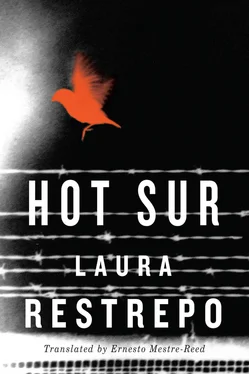“My son was an excellent teacher and he did what he could here,” Rose jumped in, leaving inhibitions aside when faced with the insulting of his boy.
María Paz’s problems hadn’t ended with that. According to Dummy, or according to Mandra X as related by Dummy, the medical care offered to the inmates at Manninpox, especially gynecological care, was shameful. The sick inmates were transferred to a special ward of a nearby public hospital, where, according to certain security regulations, they were kept in a separate wing and cuffed to their beds. They were forced to wait hours, sometimes days, then they were summarily attended, given a haphazard diagnosis, and treated accordingly. Nobody explained anything to them. What was wrong? What medication had they been given? The inmates remained ignorant of all details; they were simply acted upon as if objects. María Paz had not been an exception to this. They scraped her and she apparently recovered. The bleeding stopped, so they sent her back to her cell. But a couple of weeks later, the hemorrhaging started again, although not as bad as before. Every day little maroon spots appeared in her panties as a reminder that her insides were still damaged. Mandra X forced her to focus on the trial that she was waiting for, to prepare herself, to review the arguments in her defense, to make sure the chronology of events was clear in her head so that she wouldn’t contradict herself, wouldn’t lose hope. But María Paz wouldn’t come down from the clouds. She pretended to be out of it and got lost in dreams that had nothing to do with the facts, fantasies about that house with the garden she said she was going to buy.
Rose tells me he didn’t fully buy the picture of María Paz they painted of her in prison. He thought those women didn’t really understand her character. From what he had read, he knew the type of person she was. But, of course, when he was in Manninpox he didn’t say any of this. You don’t tease a pair of dragons when they’re sitting right in front of you. María Paz wasn’t one to be interpreted through ideologies, Rose thought, she need not be judged because she wasn’t aggressive, or proud, or forward like the rest of Mandra X’s militants. María Paz wasn’t of that brand; her style was more discreet, according to Rose, which didn’t mean it was any less effective. “Necessity has the face of a dog,” as she wrote in her manuscript, and Rose was beginning to understand that her personal code of conduct must have been guided by just such a maxim. He knew dogs well, their peculiar manner of slowly filling in the gaps with countless acts of humility and patience, and yet at the same time, with such guile and conviction that it made them by far the smartest of animals. That’s how María Paz went through life. She didn’t disgust anyone, and she didn’t bark or bite. No fuss or declarations, more or less going forward diagonally. Like a dog swimming. Rose had seen his dogs swimming. It wasn’t a crawl or a butterfly or a backstroke, but a freestyle paddling that was just enough to keep their heads above the water, yet so effective and persevering it would have allowed them to cross the English Channel if they had wanted.
Rose guessed María Paz’s character was the antithesis of a challenging and belligerent individual like Mandra X. He saw María Paz as pragmatic, measured, used to not asking for more than her share, to not exposing herself more than necessary, to moving efficiently below the surface, taking care of one thing at a time, without wasting her energies on causes or pointless issues. Mandra X was an agitator, a leader, a rebel with a cause. Not so María Paz. A survivor, as she herself had said about Bolivia, her mother, which suited her as well, Rose thought; she had become an expert at keeping her head above water without much ado, just like the dogs.
One day, the guards came to get María Paz in her cell to take her to court. The decisive moment of her trial had arrived. Mandra X had visited a few moments earlier and had seen her praying and pleading with all the saints to grant her freedom so she could find her sister, Violeta.
“To hell with the saints,” Mandra X told her, “and forget about Violeta for now. Worry about your own skin. Go fuck the asses of those sons of bitches who are keeping you locked up. The saints have nothing to do with this. You have to count on yourself.” And as María Paz walked down the hall heading for the bus that would take her to court, chained up like Houdini, Mandra X was able to yell one last thing: “You’re gonna get out of here because you’re innocent, Do you hear me? You’re innocent and you’re going to be free.” But that’s not how it turned out. María Paz had returned to her cell with a fifteen-year sentence.
A few weeks later, the shock of the tragedy lifted a bit when Pro Bono requested a mistrial from the supreme court because María had not been provided with a proper defense. In Pro Bono’s words, “the trial was shit, a sick joke, a series of fuckups.” And what happened? Pro Bono was successful with his petition, and the court ordered a retrial. A do-over. Back to the drawing board. Pro Bono petitioned that the defendant be freed in the meanwhile, but he was denied. She was considered a flight risk and remained in Manninpox.
It was during that time that María began to change. The other inmates noticed how some other person seemed to be emerging from the inside. They noted how she matured, getting stronger and distancing herself from the lost and defeated María Paz who had been at the first trial under those pitiable conditions and without any real defense. Pro Bono’s support and the solidarity with Mandra X, in combination with the hope of a new trial, animated and energized her in a way that she even developed a sense of humor. She went to bed at night with the hope that she would be found innocent and with the feeling that her freedom was just around the corner. She began to read everything she could and was excited about Cleve’s writing workshop. It was only sometime later that she got hit low again with what the Latina interns call the reckoning, especially after her sister, Violeta, refused to talk to her on the phone. Otherwise, María Paz remained active and in a good mood, consulting the dictionary to learn conjugations and grammatical rules, committed to improving her written English to leave behind some record of what she had lived through. But not everything was going as planned. The supreme court, which needed to set a date for the new trial, postponed it time and again. Why? Rose didn’t quite understand. Pro Bono explained it to him, but he was incapable of capturing the minutiae of it. Legal intricacies, asshole moves by the prosecutor, insufficient evidence, the give-and-take of Pro Bono’s negotiations with the prosecution. Months passed and the new trial started to become a mirage. And although María Paz’s mind apparently withstood the uncertainty and the accompanying stress, the same was not true of her body, and it began to falter again. María Paz internalized the issue and the hemorrhaging returned worse than ever, draining her of vital energy.
Mandra X and Las Nolis tried whatever they could to prevent this final breakdown, home remedies that were crude and insufficient to address chronic anemia, things like contraband fresh foods and supplements, eight to ten glasses of water daily, no coffee.
“A lot of the inmates thought this was bull,” Dummy told them. “They preferred other methods. I mean like spells, superstitions, and all that crap.”
Some leaned toward white magic, some toward the other kind. There was everything in there. Candomblé, voodoo, spells, palo mayombe, masses, and even exorcisms — a whole panoply of approaches, according to Dummy. Mandra X put up a fight against it because she despised the irrational, no prayers for her, or incense, or candles lit to virgins, she was at war against all that. But it was still everywhere. The prisoners had learned to appreciate María Paz. There was something about the girl that won people over, a natural seductive quality, and rumors spread that Mandra X was letting her die. According to Dummy herself, even Mandra X realized that this was true to an extent, for all she could do was apply hot compresses to deal with the sickness. Things were definitely not going well.
Читать дальше












